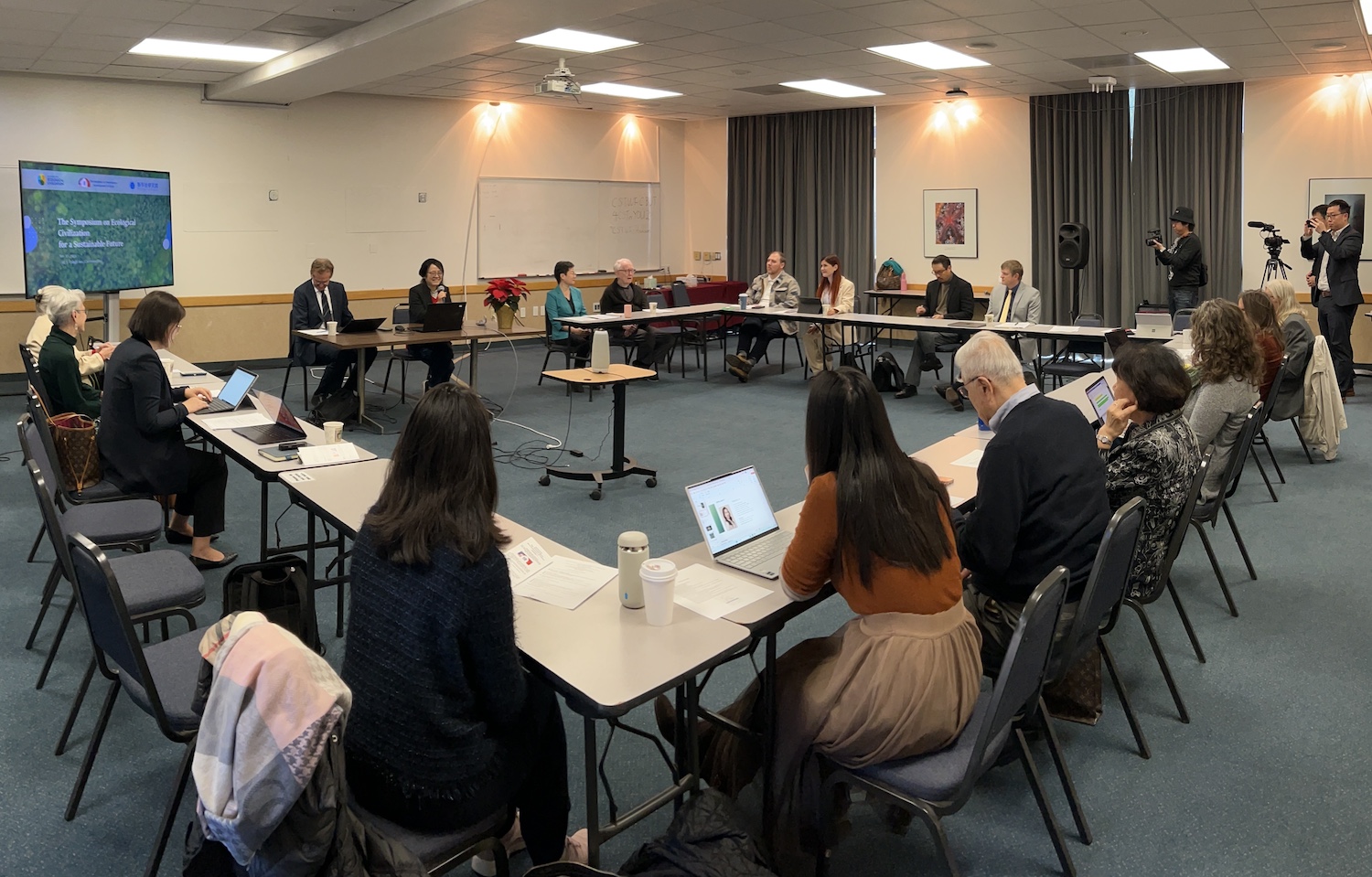November 24, 2023

CLAREMONT, CA – On Monday, November 27, Claremont School of Theology hosted the International Symposium on Ecological Civilization for a Sustainable Future on its historic Claremont campus. The event was co-organized by the Institute for Ecological Civilization (EcoCiv), the Institute for Postmodern Development of China (IPDC), and Xinhua Institute – the think tank of Xinhua News Agency, which is China’s main national news agency and ranked as one of the most influential news portals in the world.
Dr. Philip Clayton, president of EcoCiv and IPDC, and CST’s Ingraham Professor of Theology, called the symposium “a significant step for CST’s Center for Process Studies (CPS) after engaging in over two decades of dialogue between China and the West.” He hopes the gathering will help address pressing environmental needs and lead to an increase in scholarly contributions between the US and China.
A Xinhua Institute leadership team is traveling to Claremont, Cornell University, and other stops across the US for listening sessions as a part of the thawing of Chinese-American relations. The delegation seeks to better understand the attitudes of students toward the climate crisis, and what kinds of practical environmental actions they endorse or are involved with. According to their invitation, the symposium is meant to “facilitate a deeper understanding of the sustainable development goals in the United States and China, and discuss what should be done to cope with common challenges of human society.”
Speakers addressed both the main challenges, as well as the most promising solutions, related to climate change and sustaining a habitable global environment.
“The United States and China are the two highest emitters of greenhouse gasses. Agreements between these two nations to transition to green energy and sustainable economic policies will influence the world as a whole, particularly at the upcoming climate negotiations in the United Arab Emirates” Clayton explained. “The recent meeting of President Xi and President Biden in California relaunched partnerships between the two countries. This symposium aims to deepen these Chinese-American partnerships.”
Symposium participants included, among others, Dr. Clayton; Dr. John B. Cobb Jr., CST professor emeritus, founding president of the IPDC, and co-director of the CPS; Dr. Mary Elizabeth Moore, dean emerita of the school of theology at Boston University, vice chair of the Cobb Institute, and CST alum; Dr. Justin Heinzekehr, director of institutional research and assessment at Goshen College and CST alum; as well as Cherie Xue, Feihu Li, Yang Liu, and Jihong Qiao representing Xinhua Institute.
Over two decades in the making
A major focus of the discussions was about what it means to transition to a fully “ecological civilization.” In 2015, Cobb led a global conference on this transition at the Claremont Colleges, using almost $1 million in donations to bring in representatives from around the world to this 1500-person conference, including dozens of scholars and leaders from China. To continue the work, Clayton and Dr. Andrew Schwartz, CST assistant professor of process and comparative theology, founded the Institute for Ecological Civilization (EcoCiv.org) the same year, which works on long-term solutions in the areas of water, food, and economic systems that are just and sustainable. It is involved with water projects in six African countries and has founded a California-wide consortium of nonprofits to advocate “wellbeing economies“ in disinvested communities across the state.
A doctoral student in Process Studies, IPDC CEO Dr. Zhihe Wang, came to Claremont in 2002 from his position at the prestigious Academy for Social Science in Beijing. Together with his wife Dr. Meijun Fan, former vice-chair and professor of the philosophy department at Beijing Normal University, they formed and led The China Project at CPS beginning in 2005, as well as the IDPC.
Thanks to them, the Process Center’s China Project has been amazingly successful, at one time coordinating 36 academic centers across China and arranging lectures for the CST process studies faculty at major Chinese universities. Video clips from their 2022 international Eco Forum have been downloaded over 12 million times in China. In return, dozens of professors and leaders from China have come to the Center for Process Studies in Claremont as a part of CST’s visiting scholars program. Clayton noted “About a decade ago, one of these visiting scholars arranged a reception for CST professors with China’s Minister for Religious Affairs, one of the 12 top government leaders in China. During the reception, the Minister announced that Claremont was more significant for China than Harvard! Given that background, it was natural for the Xinhua News Agency to reach out to Dr. Wang and Dr. Fang to ask that the November symposium be held under the auspices of the Center for Process Studies.”
Claremont School of Theology is United Methodist in origin and affiliation and ecumenical and interreligious in spirit. CST is one of 13 United Methodist seminaries. To contribute to its future, visit: CST.edu/give.




